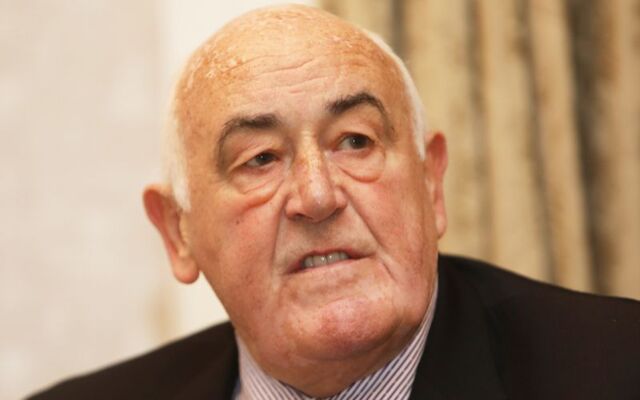Last week, Billy Lawless passed away. He was a loyal son of his native Galway, a great Chicago entrepreneur, and a tireless advocate for immigrants. He will be greatly missed.
Billy was a man full of energy with a big heart who was the first (and so far only) Senator for the Diaspora in the Irish Seanad, appointed by then-Taoiseach Enda Kenny in 2016.
I first met Billy in 2016 with my colleague Noreen Bowden, an expert on the Irish diaspora, when we found common cause in securing voting rights for Irish citizens living outside the State - whether in London, New York, or just over the Border in Derry. We tracked Billy down in Washington DC even before his Seanad appointment and over an evening dinner hatched a new organization, VotingRights.ie.
Ireland, oddly, has no absentee ballot process for citizens temporarily living overseas except for members of the military and diplomats, and unlike most members of the European Union, wants to keep it that way.
Ireland has a rule that requires citizens to intend to return to Ireland within 18 months or have their name struck from the voting register. This ban on emigrants voting is outdated, yet it stays on the books making Irish emigrants second-class citizens the minute they leave the Dublin Airport.
And Irish citizens and passport holders living just over the Border in Derry or Belfast are not allowed to vote either. As a result, when Mary McAleese ran for the Irish Presidency in 1997, her husband Martin could not vote for her because they lived in Belfast.
The 2021 IDEA global democracy report noted a total of 125 states and territories allow people living abroad to participate in legislative elections, 88 allow participation in presidential elections, and 73 countries and territories allow citizens overseas to participate in referendums. Ireland is not one of them.
Of the 14 EU Member States that hold direct Presidential elections, only Ireland, Slovakia, and Cyprus deprive their overseas citizens of the vote. Ireland is the only EU Member State that does not allow its nationals living in another EU Member State to vote in European elections. This restriction violates the EU’s freedom-of-movement principle in depriving citizens the vote in their home country.
Billy, to his credit, with full voice called for voting rights for all Irish citizens. The 2013 Constitutional Convention had proposed that all Irish citizens including emigrants be allowed to vote in future Presidential elections. The new Foreign Minister Simon Coveney was an enthusiastic supporter since this reform was part of the new government program of government.
In 2017, the delegates to the Global Civic Forum were unanimous in their support and Ciaran Cannon T.D. was appointed the Minister for the Diaspora. Cannon took to his new position with great energy and met with countless groups across the diaspora. And in 2021 we issued a set of papers entitled CitizenshipPapers.ie.
We soon realized, however, that securing this reform would be an uphill fight. We met with the new Minister for Foreign Affairs Micheál Martin, a long-time friend but a cautious man, and over the years, held several Zoom conversations with the Minister for Electoral Reform Malcolm Noonan T.D.
In 2020, the government turned its back on voting rights and failed to reappoint Billy as the Senator for the Diaspora.
After Billy’s stellar performance in giving a voice to the Irish abroad, we were more than disappointed. Today, Irish emigrants have no representation in the Seanad - and there is no Northern voice. Partition has its uses. In 2021, Billy received his consolation prize becoming a recipient of the Presidential Distinguished Service Award.
So what to make of this experience? I have come to the conclusion that Ireland is a parochial and complacent democracy, turning its back on voting rights for citizens living outside the state including Northern Ireland. The Leinster House establishment is just fine with the status quo even as democracy declines around the world. None of the major political parties standing for the upcoming election make mention of voting rights for all citizens in their manifestos. Indeed many long overdue democratic reform proposals from Seanad reform to voting rights are always kicked to touch.
Ireland is an emigrant nation - and for over a decade about 30,000 young people have left Ireland every year. These are the same young people who twice came #HometoVote to make Ireland a more progressive nation. Many will return home, but the State does not make it easy even now. If Ireland wants to be at the very heart of the EU experience in the years to come, it should abide by international and EU democratic norms and become a more inclusive democracy.
Ireland should not assume that it gets a free pass from the heady promises of populist authoritarian strongmen. In recent elections in both Poland and Moldova, the vote of the diaspora was critical to the election of Pro-Western leaders. Allowing a voice in the political process for all citizens, regardless of their residence, would safeguard Irish democracy and be a tangible step toward Irish unity.
Tabhair dúinn an vóta. RIP Billy Lawless.
*Kevin J. Sullivan helped to co-found VotingRights.ie in 2016 and is currently the Executive Director of the Ad Hoc Committee to Protect the GFA.




Comments